
Exposé Online
What's old
Exposé print issues (1993-2011)
- 1 (October 1993)
- 2 (February 1994)
- 3 (May 1994)
- 4 (August 1994)
- 5 (October 1994)
- 6 (March 1995)
- 7 (July 1995)
- 8 (November 1995)
- 9 (March 1996)
- 10 (August 1996)
- 11 (February 1997)
- 12 (May 1997)
- 13 (October 1997)
- 14 (February 1998)
- 15 (July 1998)
- 16 (January 1999)
- 17 (April 1999)
- 18 (November 1999)
- 19 (May 2000)
- 20 (October 2000)
- 21 (March 2001)
- 22 (July 2001)
- 23 (December 2001)
- 24 (April 2002)
- 25 (September 2002)
- 26 (February 2003)
- 27 (August 2003)
- 28 (December 2003)
- 29 (April 2004)
- 30 (September 2004)
- 31 (March 2005)
- 32 (September 2005)
- 33 (May 2006)
- 34 (March 2007)
- 35 (January 2008)
- 36 (October 2008)
- 37 (July 2009)
- 38 (July 2010)
- 39 (Summer 2011)
Reviews
Muslim Gauze — The Suns of Arqa Mixes
(Arka Sound 22120, 2001, CD)
Suns of Arqa — Aberglaub: Remixes Vol. 3
(Arka Sound 22118, 2001, CD)
Suns of Arqa — Animan
(Arka Sound 2110, 1996, CD)
Suns of Arqa — Cosmic Jugalbandi
(Arka Sound 22115, 1999, CD)
Suns of Arqa — Jaggernaut: Whirling Dub
(Arka Sound 2103, 1992, CD)
Suns of Arqa — Kokoromochi
(Arka Sound 2104, 1992/2001, CD)
Prince Far-I with Suns of Arqa — Musical Revue
(ROIR (Reachout International Records) RE161CD, 1983, CD)
Suns of Arqa / Gayan Uttejak Orchestra — Suns of Arqa Meet the Gayan Uttejak Orchestra
(Arka Sound 22113, 1999, CD)
Suns of Arqa — Revenge of the Mozabites
(Arka Sound 33116, 1980/2001, CD)
by Jon Davis, Jeff Melton, Published 2003-08-01
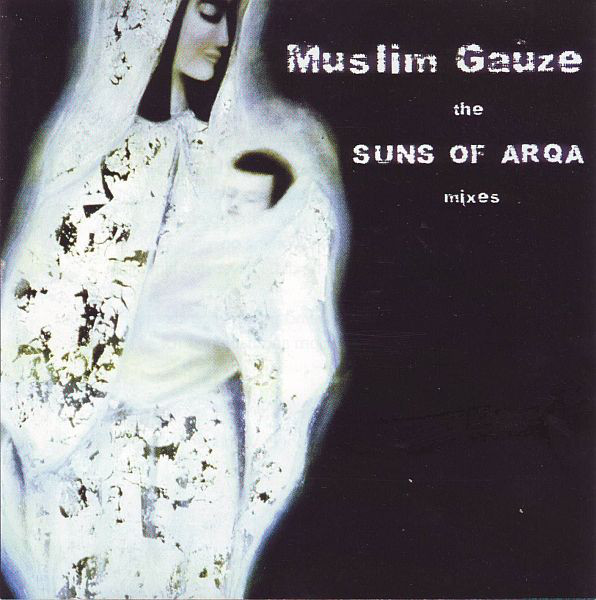
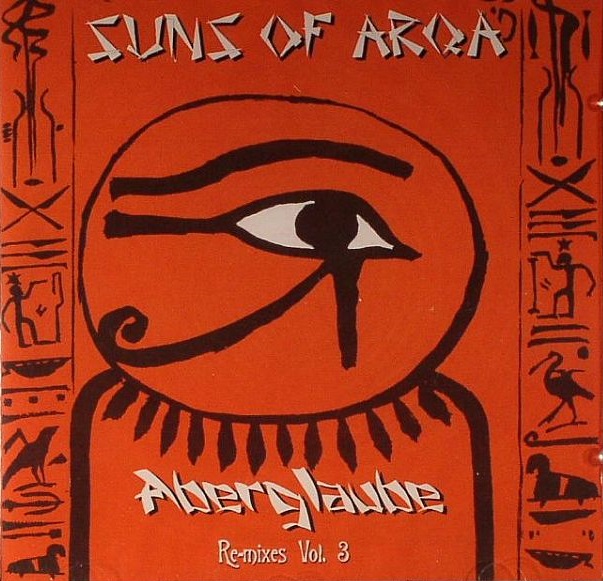

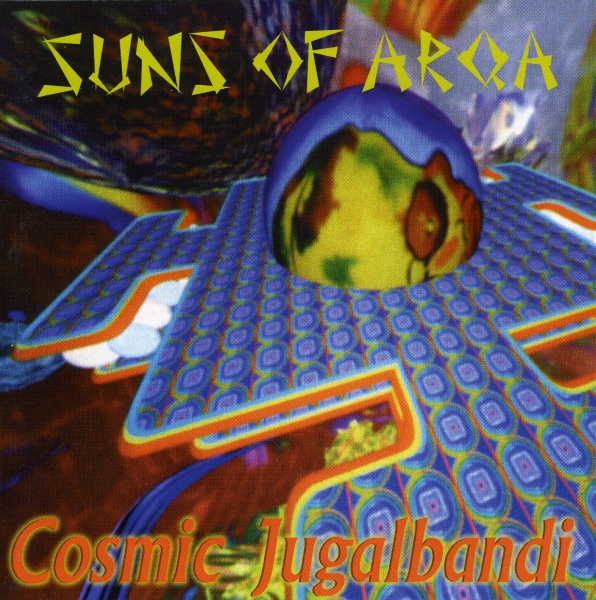

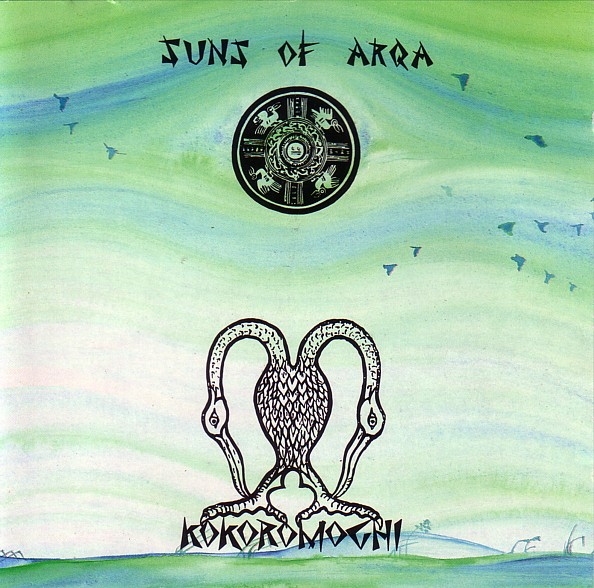
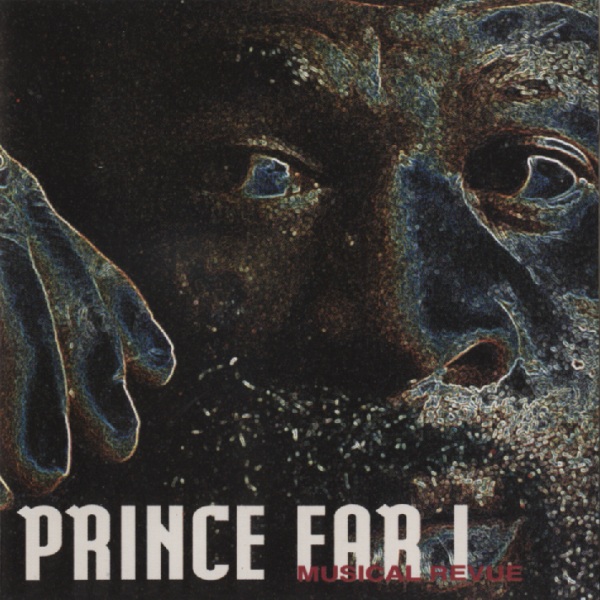
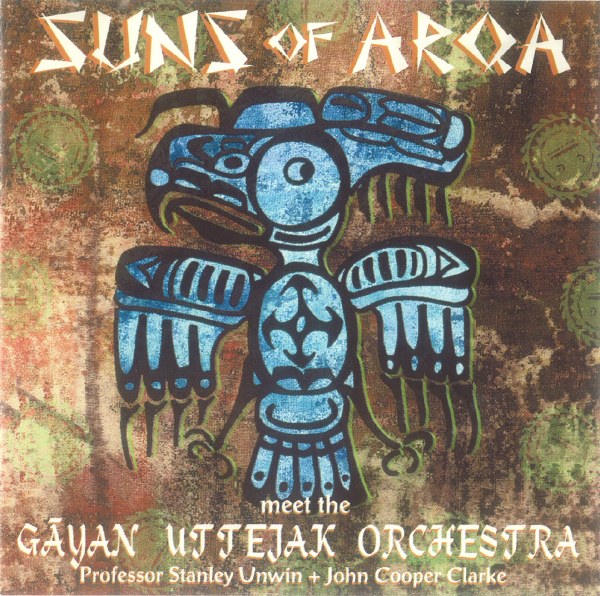
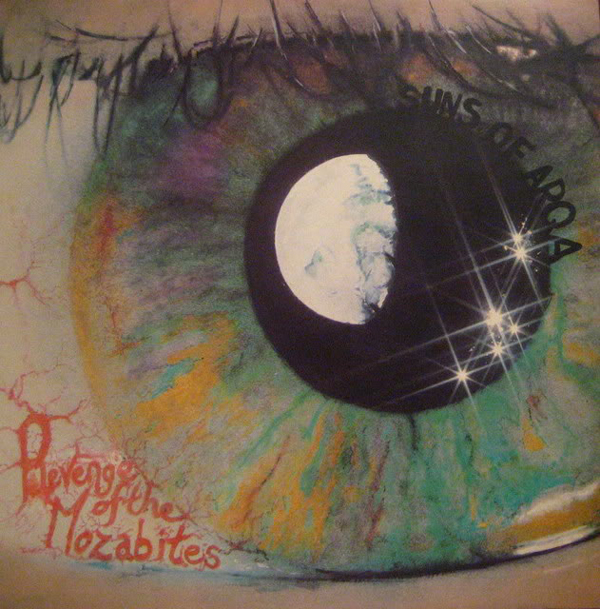
Suns of Arqa started in the late 70s, first gaining notice as the touring band for reggae star Prince Far-I. Bassist / multi-instrumentalist Michael Wadada has been a constant in the band which has seen a large number of members and guests. When they recorded their first album back in 1979, there was nothing in the musical landscape to compare them to. Revenge of the Mozabites is a fusion of Middle Eastern and Indian sounds with Jamaican-style dub unlike much of anything heard even today, unless it’s some of the projects Bill Laswell or Jah Wobble have produced. The production is a bit primitive at times, but the adventurous spirit of the music is crystal clear. Tabla provides rhythm for violin and harmonium, then a reggae beat comes in on the bass and drums, all with tons of outer-space echo. Then a Spanish guitar and castanets join the dubfest, along with a wordless female voice. For contrast, the next track is “Sully’s Reel” an Irish-sounding piece for fiddle, flute, and acoustic guitar, all treated with phase shifting and other effects. As the album progresses, these elements return in various combinations.
Kokoromochi (1992) takes the various styles presented in the debut (minus the jigs and reels) and refines the sound, losing much of the reggae influence and concentrating on India. In spite of the mellower mood, this is one of the more satisfying of their releases, and it should appeal to fans of 80s Embryo. The bamboo flute of Raghunath Seth and the violin and mandolin of Dr. Himadri Chaudhuri alternate as the dominant voices, with tabla and Wadada’s bass for backing.
Jaggernaut Whirling Dub (1992) is one 16 minute track (originally on an LP called Antler Subway) along with three remixes of same. Lead instruments are the shenai of Kadir Duresh, Tim Wheater’s flute, and Marek Miczyk’s violin; backing is much more energetic than on Kokoromochi, with a drum kit courtesy of “Sticksman” in addition to tablas and Wadada’s bass. The lengthy remixes range from ambient to moderately upbeat, with no dance-floor thumping, but as long as you’re not in a hurry for things to happen, this is quite an enjoyable CD.
Aberglaube (2001) consists of reworkings of tracks off other SoA releases, including a very trippy take on “Tomorrow Never Knows” that sounds like Steve Hillage in an especially altered mood. A few tracks are truly excellent, and most of it is fairly interesting; if you think a partly electronic, very spacey interpretation of world music sounds like a good idea, you’ll probably like it.
When Muslim Gauze (AKA Bryn Jones) met Wadada, the resultant eighteen pieces generated a darker tone. Darkwave enthusiasts may want to examine these sonic sculptures as chop and edit approach used almost exclusively with heavy bass and sinister consequences. The 2001 disc is mostly three-minute sequences that bounce along tempo-wise with minimal interaction or soloing. “Finding the Chord I Play” is grounded on tabla and fierce grinding bass line; “Annanage” is directed more toward techno; “Khammarubi” relies on crystal synth settings to create a precious tonal quality.
The live album Animan (1997) features sitar and flute heavily, with some propulsive beats from tabla and other drums, all accompanied by some Gilli Smyth style “space whisper” vocals. This alone is enough to mar the enjoyment, though fans of Mother Gong will probably do just fine.
SoA’s 1999 intersection with the traditional Hungarian Gãyan Uttejak Orchestra of László Hortobágyi yields a more traditional Muslim set. Again kit drums and high hat drive the overall dub mix, and the dance elements are consistent with the group’s other works. Opening piece, “Mahãdub” defers to religious context that was the same set of influences that Brian Eno and David Byrne together extracted into western pop music. “Miyãn – Ki Dub” is perhaps the most surreal on the disc with swirling flutes and tabla and lush synthesizer backing that makes it a standout track.
The band’s newest (as of 2000) studio album is perhaps the best. “Jugalbandi” is a term used in India for a musical duet, and the CD is primarily a dialog between violin (Johar Ali Khan) and bansuri flute (Baghunath Seth). Backing is the now-typical SoA fare of tablas, drum kit, and electronics. All in all, a nice way to get your India fix with some modern sounds in place of any academic stuffiness.
Filed under: Reissues, Issue 27, 2001 releases, 1996 releases, 1999 releases, 1992 releases, 1983 releases, 1980 recordings
Related artist(s): László Hortobágyi / Gayan Uttejak Orchestra, Suns of Arqa
What's new
These are the most recent changes made to artists, releases, and articles.
- Review: LeoNero - Monitor
Published 2026-03-04 - Review: Sterbus - Black and Gold
Published 2026-03-03 - Release: Janel Leppin's Ensemble Volcanic Ash - Pluto in Aquarius
Updated 2026-03-02 15:06:51 - Release: Janel Leppin - Slowly Melting
Updated 2026-03-02 15:05:27 - Release: Alister Spence - Always Ever
Updated 2026-03-02 15:04:11 - Release: Let Spin - I Am Alien
Updated 2026-03-02 15:02:41 - Review: Falter Bramnk - Vinyland Odyssee
Published 2026-03-02 - Review: Exit - Dove Va la Tua Strada?
Published 2026-03-01 - Review: Steve Tibbetts - Close
Published 2026-02-28 - Release: We Stood Like Kings - Pinocchio
Updated 2026-02-27 19:24:02 - Release: Stephen Grew - Pianoply
Updated 2026-02-27 19:20:11 - Release: Thierry Zaboitzeff - Artefacts
Updated 2026-02-27 00:16:46 - Review: Kevin Kastning - Codex I & Codex II
Published 2026-02-27 - Release: Zan Zone - The Rock Is Still Rollin'
Updated 2026-02-26 23:26:09 - Release: The Leemoo Gang - A Family Business
Updated 2026-02-26 23:07:29 - Release: Ciolkowska - Bomba Nastoyashchego
Updated 2026-02-26 13:08:55 - Review: Immensity Crumb - Chamber Music for Sleeping Giants
Published 2026-02-26 - Release: The Gatekeepers - Diary of a Teenage Prophet
Updated 2026-02-25 15:55:58 - Listen and discover: Mordecai Smyth will not break your back
Published 2026-02-25
